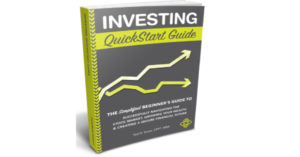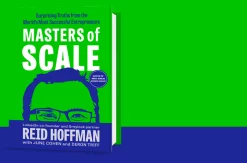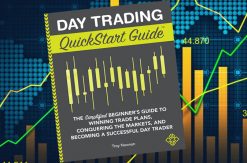Investing Quickstart Guide: The Simplified Beginners Guide to Successfully Navigating the Stock Market, Growing Your Wealth, & Creating a Secure Financial Future by Ted D. Snow
About The Book:
The book you wish you’d had before you began investing.
The Investing QuickStart Guide offers a simplified but expansive introduction to the world of investing. Author Ted Snow brings 30 years of experience in the finance industry, much to the benefit of novice learners and experienced investors alike. Snow provides readers with the complete picture of stocks, bonds, treasuries, ETFs, mutual funds, indexes, REITS, and several other investment securities.
Snow’s intrepid but practical asset-allocation investment philosophy is marvelously
communicated and highly appropriate for market newcomers.
The key insights of Warren Buffett, Peter Lynch, Burton Malkiel, and James Altucher all play important roles in this seminal investment resource. But unlike most of today’s books on investment, the Investing QuickStart Guide threads the needle between thorough and simple.
You will learn the market from end to end, while also enjoying Snow’s fascinating personal stories and insights from the front lines of the finance industry.
You don’t need to be a rocket scientist. Investing is not a game where the guy
with the 160 IQ beats the guy with the 130 IQ.
– WARREN BUFFETT
About The Author:
My roots in the financial services industry started in 1987 when I began working at a well-known investment company based in Boston, MA. Over the next ten years, the best education I received was learning the securities industry while helping customers with mutual fund investing, individual securities trading, financial planning concepts, and learning to provide superior customer service.
In the last year of my career at this company, I grew uneasy. I had the desire to advise people with much more depth than I was allowed to. I saw too many people making emotional and risky financial decisions because they chose to “do it themselves”. They simply didn’t know what they didn’t know.
Coordination of retirement, investments, insurance, business, estate, and taxes was how I could truly help these customers, which they were in desperate need of. While earning my MBA in Financial Planning at the University of Dallas, I developed a desire for entrepreneurship and decided it was time to take a huge leap of faith to start my own practice. With no clientele and armed with industry knowledge and the skill of great customer service, I set out to build a financial planning practice.
After spending eight additional years with independent firms building my practice, I founded Snow Financial Group, LLC in 2006 with the purpose of offering true “personal” service to my clients. We focus on two primary “values”.
First, offering great client service. To this end, and relative to other financial advisory firms, we keep our client list small to provide clients quick access to me and staff while cultivating great relationships.
Second, creating a comfortable and easy atmosphere where people like to come and talk about their financial lives.
The industry has changed so much since 1987; however, my passion for these core values has proven to be a successful formula. Snow Financial Group, LLC starts with being personal.
My Review:
I’m not an investor but I always follow Investing, Business & money-related news, when I first noticed that I won this book in exchange for my honest review, I was so excited and couldn’t wait for it to be delivered.
Appearance:
Let me start off with its cover, it has a nice design and color, good quality of paper and printing, and very smooth in my hand which I really liked.
Content:
The beginner-friendly book has some sort of historical examples about $12 Apple’s share back in 2008 and Wal-Mart stocks when it first went public in the fall of 1970.
It tells you about not just the benefits and how to wisely invest but, The Risks of Not Investing Many would-be investors stay away from the stock market because they do not want to put their hard-earned money at risk. Risk is a very important factor that should be considered very seriously by investors.
This book has 9 chapters: The Language of Investing, Brokerages or Robo-Advisors, Strategies, Psychology, Time management, Beyond Profit, and Investing Your Way to Financial Freedom.
In “Chapter 3: How to Use Time to Your Advantage, Grow Your Wealth, and Fund the Perfect Retirement,” which I really liked it because you’ll learn how to protect not just your future but your family.
This book’s topic says it’s for beginners but I found it even useful for experienced investors, as there are some very useful tips and reminders we tend to forget as we become busy in professional life. it tells you how to react to a bull or bear market cycle and the difference between investing in bonds and stocks, how the trading process happens, and how to read stock tickers and stock tables, in simple language.
Sometimes I read a book and spend a day but I learn as little as a page, which I’d appreciate because I believe what you’ll learn even as short as a sentence is priceless, and you will find that useful when you use it in your life.
I give a truly 5-star review out of 5 because of all those reasons that I mentioned above, and I truly suggest you order it today even if you’re not an investor or it’s not your interest. It is very easy to understand and grasp, you will learn a lot from it.
I’d like to thank John Donnachie and Clydebank Media for providing me a copy of this book along with the other digital materials including modules, Audio, video content, and free access to all these great materials on their website in exchange for honest and unbiased feedback for the book.
Did you Know (Book Articles):
- Exchange-Traded Funds:
An ETF (exchange-traded fund) is something of a hybrid between a mutual fund and a stock. Like stocks, ETFs always trade on the open market. If you watch CNBC or another financial news network, you will see ETFs floating along with the ticker. Like mutual funds, ETFs can be comprised of a variety of different securities and can encompass many investment strategies and goals.
- The Risks of Not Investing: The Inflation Risk
Idle cash is subject to inflation. If you leave large sums of money in a bank account for a long period of time, it may not be able to generate enough interest to outpace the rate of inflation. Inflation refers to the decline in the purchasing power of a unit of currency, leading to higher and higher prices for the same goods.
- Initial Public Offering (IPO):
When a company first issues stock it is known as an initial public offering (IPO). A company that wants to go public will usually make a deal with an investment bank. The bank acts as an “underwriting firm,” agreeing to temporarily buy up all shares of stock that the company intends to offer to the public. The underwriting firm is taking a risk by assuming it will be able to sell these shares to the public.
I always write my reviews on Amazon, 3ee, Goodreads, LibraryThing, and Social Media such as Facebook, Instagram, Twitter, Linked In, Telegram, and Google+.
If you also have read this book, please share your review below, we greatly appreciate your comment, and let’s talk about it!




July 19, 2018
When a company first issues stock it is known as an initial public offering (IPO). A company that wants to go public will usually make a deal with an investment bank. The bank acts as an “underwriting firm,” agreeing to temporarily buy up all shares of stock that the company intends to offer to the public. The underwriting firm is taking a risk by assuming it will be able to sell these shares to the public.
Investing Quickstart Guide: by Ted D. Snow
July 19, 2018
The Inflation Risk
Idle cash is subject to inflation. If you leave large sums of money in a bank account for a long period of time, it may not be able to generate enough interest to outpace the rate of inflation. Inflation refers to the decline in purchasing power of a unit of currency, leading to higher and higher prices for the same goods.
Investing Quickstart Guide: by Ted D. Snow
July 19, 2018
Exchange Traded Funds
An ETF (exchange traded fund) is something of a hybrid between a mutual fund and a stock. Like stocks, ETFs always trade on the open market. If you watch CNBC or another financial news network, you will see ETFs floating along the ticker. Like mutual funds, ETFs can be comprised of a variety of different securities and can encompass many investment strategies and goals.
Investing Quickstart Guide: by Ted D. Snow